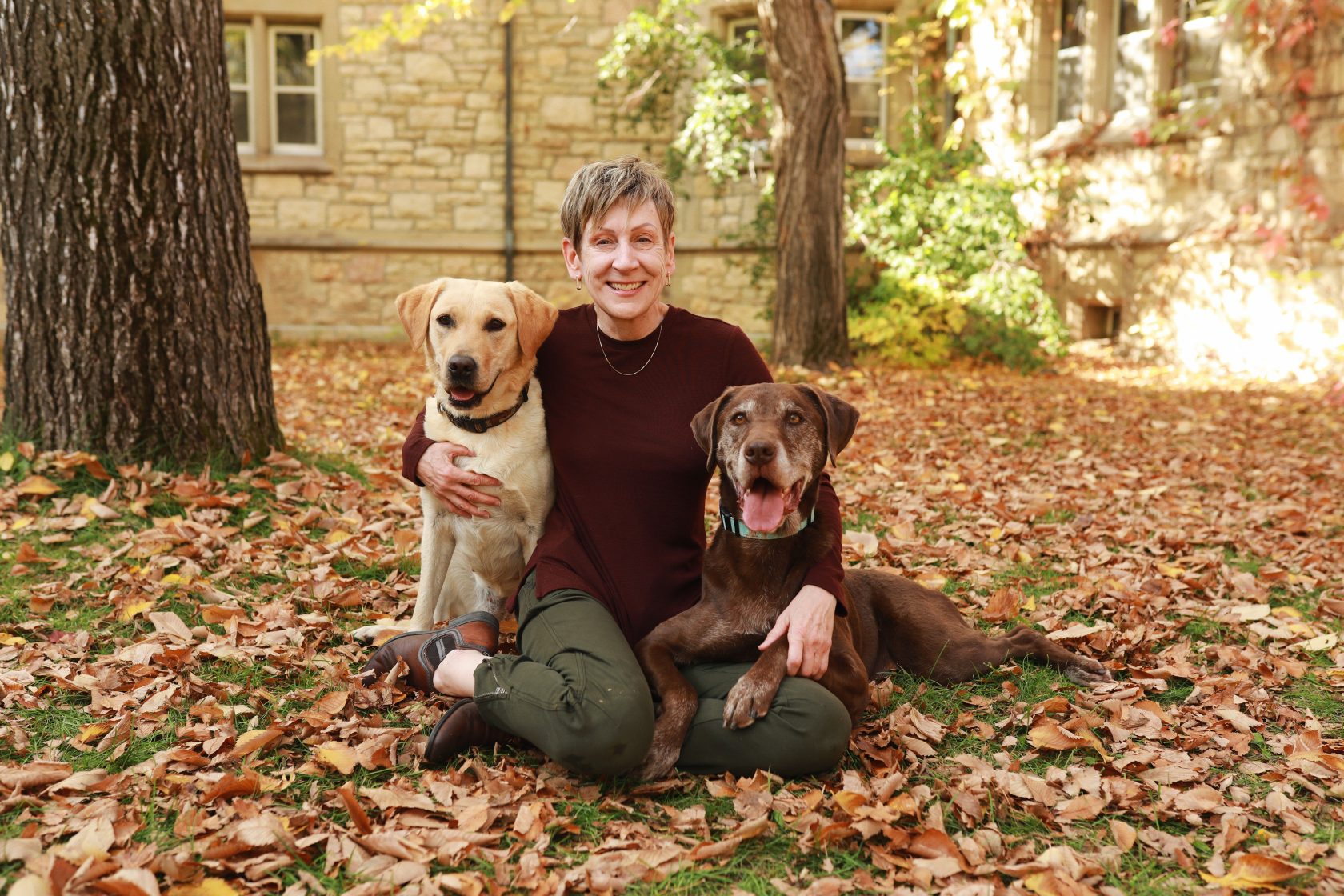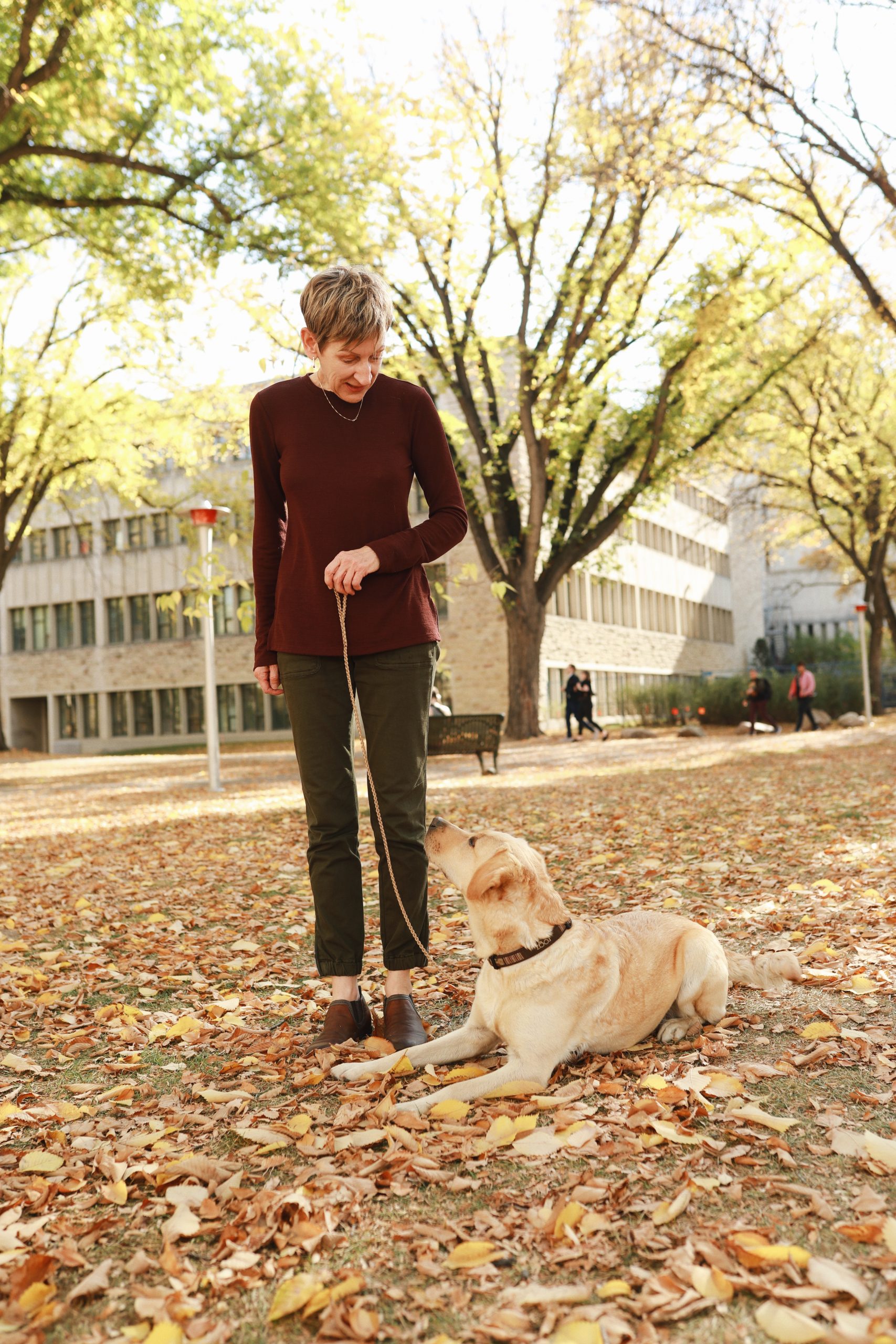Dr. Darlene Chalmers with Reina and Ruby.

A Q&A with Dr. Darlene Chalmers, associate professor in the University of Regina's Faculty of Social Work
What sparked your interest in studying canine-assisted interventions?
Social work is about social justice and effecting change through direct practice with individuals, families, communities and in policy development.
We know that the human-animal bond can bring powerful benefits – from seeing people’s relationships with their pets and hearing them speak about how important animals are to their well-being. In addition to anecdotal evidence, there also is a growing body of research that confirms that integrating animals into therapeutic programs, for example, can lead to strong positive outcomes.
This should inspire action to not only better support individuals in their relationships with animals but also advocate for wider access to animal-assisted interventions. The truth is that there are significant barriers preventing some of our most vulnerable and marginalized community members from benefiting from this bond, including those facing housing insecurity, living in elder-care facilities or being incarcerated.
That’s why I see creating opportunities for people to engage with animals through guided interventions as a form of social justice.
What makes such interventions so successful?
There is a lot of evidence that speaks to the importance of strong social connections – and how they can serve as a buffer when people experience adversity. In our work, we see a lot of people who are disconnected from their families and communities; they’re just trying to survive.
Interacting with animals is a catalyst for connection, and we found that this feeling of being connected tends to endure over space and time, even when the therapy dog is no longer there. When we work with prisoners, for example, they typically keep photos of the program dogs. Besides giving them a chance to reflect on these experiences, this often conveys a sense of family.
Our relationship with animals is also a great conversation starter. I’ve found that almost everyone has meaningful stories to share. I have two Labrador retrievers, and I see the joy they bring as part of our work (they are both therapy dogs and trained and recognized as service dogs).
People will often come up to me and say, “I had a dog too, and we did so many things together.” This can lead to moments of sharing and connection.
What are some of the key insights we can gain from human-animal connections?
There are multiple interpretations for why these connections are so important, starting with the concept of biophilia – our fundamental need to affiliate with other living things – which is part of our own evolutionary development.
The awareness that we humans don’t inhabit this world alone, that we live in an environment with many species, both wild and domesticated, can come with the realization that not everyone – or every species – is treated with equal concern. For me, this inspires a reflection on what kind of world we want to live in: a world where compassion is extended to everyone and every species.
This brings us to the “one health” framework, where the health of people, animals and the environment cannot be viewed in isolation. This knowledge is not new as Indigenous understandings of this interdependence – between personal and ecosystem well-being – have existed for millennia.

How can we better support human-animal relationships in social work practice and beyond?
Through a survey of social workers across the Prairie Provinces, we learned that despite a lot of interest in integrating animals-assisted interventions, what’s covered in social work curriculum about this area of practice is very limited.
There needs to be a strong evidence-based foundation of why – and how – animal-assisted interventions can be beneficial. And since these programs wouldn’t exist without the animals, animal welfare is key. We’re working very diligently on research that can support training programs for social work education as well as other disciplines that can benefit from such insights.
Another aspect of our work is to raise public awareness so that we can look at society – and all our programs and policies – with a lens of advancing positive relationships between humans, animals and the environment.












